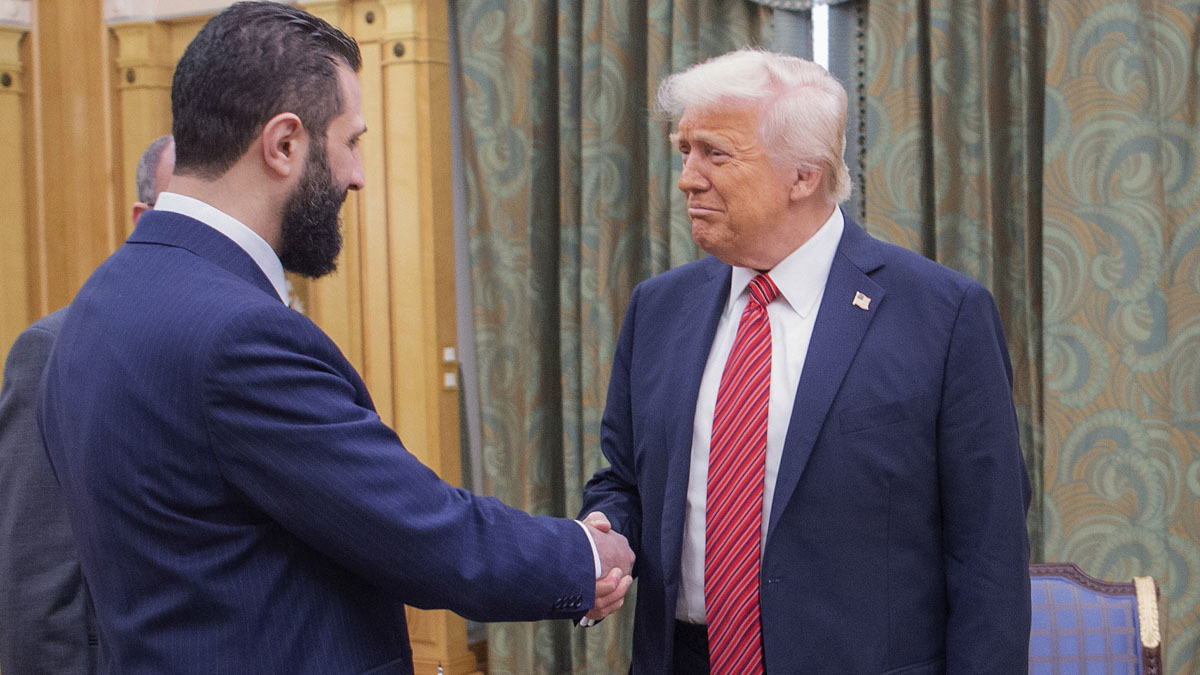Trump lifts Syria sanctions in bid to rebuild ties and counter Iran; orders review of Prez Ahmed al-Sharaa’s ‘terrorist’ designation
 In this photo released by the Saudi Royal Palace, President Donald Trump, right, shakes hands with Syria's interim President Ahmad al-Sharaa, in Riyadh, Saudi Arabia, May 14, 2025. (Bandar Aljaloud/Saudi Royal Palace via AP)
In this photo released by the Saudi Royal Palace, President Donald Trump, right, shakes hands with Syria's interim President Ahmad al-Sharaa, in Riyadh, Saudi Arabia, May 14, 2025. (Bandar Aljaloud/Saudi Royal Palace via AP)
President Donald Trump signed an executive order yesterday lifting the bulk of US economic sanctions on Syria, signalling a major policy shift and embracing the new government in Damascus despite concerns over its leader’s extremist past. The move marked a dramatic departure from decades of American policy that sought to isolate Syria’s regime. It followed Trump’s unexpected announcement in May during a visit to Saudi Arabia, where he met Syria’s new president, Ahmed al-Shara.
Al-Shara, a former commander of a rebel group once designated a terrorist organisation by the US, came to power in December after toppling Bashar al-Assad, whose rule had spanned nearly two decades of civil war and repression.
Describing the Syrian leader as “young, attractive” and “tough”, Trump argued that Syria deserved a chance to recover from a brutal conflict that began in 2011. While some US officials remain cautious about al-Shara’s jihadist background, many acknowledge he broke ties with Al-Qaeda years ago.
The White House said the executive order would end most economic restrictions imposed under a 2004 sanctions regime targeting Syria for its chemical weapons programme. It also signalled a readiness to explore further relief, especially in areas critical to reconstruction, such as energy and infrastructure development. However, some sanctions remain in place, particularly those required by the Caesar Syria Civilian Protection Act of 2019, which blocks US support for reconstruction projects and continues to classify Syria as a state sponsor of terrorism.
The order directs Secretary of State Marco Rubio to examine potential suspension of Caesar Act sanctions, loosen restrictions on the export of certain goods, and reassess Syria’s designation as a terrorism sponsor. It also calls for a review of al-Shara’s terrorist label and explores the possibility of securing broader relief through the United Nations.
Syrian foreign minister Asaad Hassan al-Shaibani welcomed the move, calling it a “historic” step that removed a “major obstacle” to economic recovery. He said the lifting of sanctions would allow for vital infrastructure rebuilding and the return of displaced citizens.
Trump officials framed the decision as a strategic measure that would protect US interests by preventing the resurgence of Islamic State and encouraging diplomatic normalisation between Syria and Israel. While the White House distanced itself from endorsing specific territorial claims, a senior official noted the US would pursue gradual confidence-building measures, with “metrics and milestones” leading to eventual trust between former adversaries.
White House press secretary Karoline Leavitt said the administration would maintain pressure on Assad, his associates and others responsible for war crimes or linked to groups like Islamic State and Iran-backed militias. “This is not about letting everyone off the hook,” she told reporters. “It’s about rewarding progress and helping Syria move forward."
Al-Shara has said that sanctions crippled his fragile transitional government’s ability to pay civil servants and begin rebuilding. Trump had promised in May that sanctions would be lifted once Assad was ousted. Brad Smith, acting under-secretary for terrorism and financial intelligence, said the order aimed to reintegrate Syria into the global financial system, paving the way for international commerce and encouraging foreign investment.
The change in policy is also reshaping regional dynamics. Assad’s ouster dealt a blow to Iran, which had long backed his regime politically and militarily. The Gulf states, eager to curb Iranian influence, have moved quickly to offer Syria economic aid and investment opportunities.
Qatar and Saudi Arabia paid off Syria’s $15.5 million World Bank debt, requalifying the country for international reconstruction funding. State-owned airlines in the Gulf have announced plans to resume flights to Damascus.
One of the most significant early investments came from Dubai-based port operator DP World, which signed an $800 million deal with the Syrian government to develop the port of Tartus. During the Assad regime, the port hosted a Russian naval base. Its redevelopment is seen as key to Syria’s recovery and economic revival.
Middle East